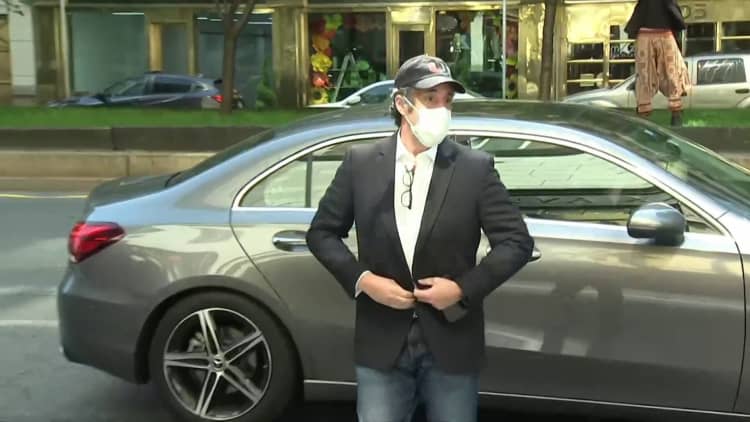A federal judge Tuesday quickly granted President Donald Trump's former personal lawyer and fixer Michael Cohen a hearing on his new lawsuit seeking his release from prison.
He was returned to a cell in early July after refusing to agree not to publish a damning book about Trump while serving a criminal sentence in home confinement.
The hearing on Cohen's request for a temporary restraining order will be held at 11 a.m. Thursday in U.S. District Court in Manhattan.
If the order is granted, Cohen could be sprung, for the second time in two months, from the federal prison in Otisville, N.Y.
"This case is about a brazen assault on the First Amendment and the rule of law," said Danya Perry, the attorney representing Cohen in the lawsuit, along with lawyers from the American Civil Liberties Union.
"We trust that our Constitution will prevail and that free speech will continue to be protected, for our client and for all others by extension," Perry said.
The Justice Department, a defendant in the suit, had no immediate comment. The Bureau of Prisons, which is another named defendant, declined to comment.
Cohen, 53, was in the middle of serving a three-year sentence when he was released from Otisville in late May due to concerns that the Manhattan resident's pulmonary health issues put him at elevated risk from the coronavirus.
He had pleaded guilty in 2018 to financial crimes, lying to Congress about a planned Trump Tower in Moscow, and to campaign finance crimes related to hush money payments to two women who claim to have had sex with Trump, who denies their allegations.
On July 9, Cohen and his lawyer appeared at U.S. Probation offices in Manhattan to review the conditions of his home confinement, which would include electronic location monitoring.
Cohen's lawyer Jeffrey Levine has said that they were surprised to be presented at that meeting with restrictions that would bar Cohen from speaking to news reporters or to posting on social media during his release, as well as from publishing a book.
Cohen soon after was taken into custody, without warning, by Bureau of Prisons personnel and shipped back to Otisville, despite saying he would agree to the restrictions, Levine has said.
The bureau has said Cohen was remanded to prison after refusing to sign the agreement.

Cohen on Monday sued U.S. Attorney General William Barr, who oversees the Bureau of Prisons, seeking his release.
The suit said, "He is being held in retaliation for his protected speech, including drafting a book manuscript that is critical of the President — and recently making public his intention to publish that book soon, shortly before the upcoming election."
The suit says that the demand that Cohen refrain from publishing that book infringes on his Constitutional right to free speech.
Cohen's suit says that he began the book before arriving in Otisville last year but continued writing it in prison.
The suit notes that the Bureau of Prisons' own policies "encourage inmates to use their leisure time for creative writing and to permit the direct mailing of all manuscripts as ordinary correspondence."
"The policy provides that '[a]n inmate may prepare a manuscript . . . for publication while in custody without staff approval,' and 'may mail a manuscript as general correspondence,'" the suit says.
Cohen's book is expected to trash Trump, whom Cohen loyally served for years before the attorney fell under criminal investigation early in Trump's presidency in connection with the hush money payouts.
"Mr. Cohen's book describes Mr. Cohen's first-hand experiences with Mr. Trump, and it provides graphic details about the President's behavior behind closed doors," the suit says.
"For example, the narrative describes pointedly certain anti-Semitic remarks against prominent Jewish people and virulently racist remarks against such Black leaders as President Barack Obama and Nelson Mandela."
The suit goes on to say that as Cohen has previously stated, the book will be "unfavorable" to the president, whom Cohen called "a cheat, a liar, a conman, a racist" in congressional testimony.
"The government cannot imprison Michael Cohen for writing a book about President Trump," said Ben Wizner, director of the Speech, Privacy, and Technology Project at the American Civil Liberties Union.
"The gag order that the government sought to impose on Mr. Cohen was an unconstitutional prior restraint, and his continued imprisonment is part of a dangerous pattern of retaliation against Trump critics."


